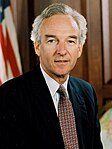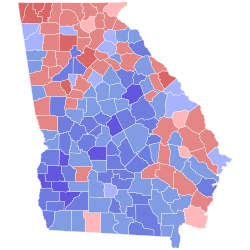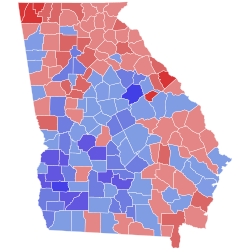1992 United States Senate election in Georgia
The 1992 United States Senate election in Georgia was held on November 3, 1992. In the general election, which occurred simultaneously with the presidential election, incumbent Democratic U.S. Senator Wyche Fowler received more votes, but did not achieve a simple majority. Under Georgia law, this demanded a runoff. Paul Coverdell, the former Director of the Peace Corps, edged out Fowler in the November 24 runoff by a narrow margin, flipping the seat to the Republicans. It was the first Senate runoff election to be held in Georgia since runoffs were first mandated in 1964. This was the third consecutive election for this Senate seat where the incumbent was defeated.
| |||||||||||||||||
| |||||||||||||||||
Coverdell: 40–50% 50–60% 60–70% 70–80% Fowler: 40–50% 50–60% 60–70% 70–80% 80–90% | |||||||||||||||||
| |||||||||||||||||
Republican primary
editThe general primary was held July 21, 1992.[1] A run-off between the top two Republican contenders was held on August 11, in which Paul Coverdell defeated Bob Barr.
Candidates
edit- Bob Barr, President of Southeastern Legal Foundation and former U.S. Attorney for the Northern District of Georgia
- Paul Coverdell, former Director of the Peace Corps and State Senator from Atlanta
- John Knox, former Mayor of Waycross
- Dean Parkison, retired drug store owner and perennial candidate
- Charlie Tanskley
Results
editResults[2] for the first round showed that since Paul Coverdell did not win a majority of the vote, a runoff was held between him and Barr. Coverdell subsequently won the runoff.
| Party | Candidate | Votes | % | |
|---|---|---|---|---|
| Republican | Paul Coverdell | 100,016 | 37.05% | |
| Republican | Bob Barr | 65,471 | 24.25% | |
| Republican | John Knox | 64,514 | 23.90% | |
| Republican | Charlie Tanskley | 32,590 | 12.07% | |
| Republican | Dean Parkison | 7,352 | 2.72% | |
| Turnout | 269,943 | 100.00% | ||
| Party | Candidate | Votes | % | |
|---|---|---|---|---|
| Republican | Paul Coverdell | 80,435 | 50.49% | |
| Republican | Bob Barr | 78,887 | 49.51% | |
| Turnout | 159,332 | 100.00% | ||
General election
editCandidates
edit- Paul Coverdell, former State Senator from Atlanta (Republican)
- Wyche Fowler, incumbent U.S. Senator (Democratic)
- Jim Hudson (Libertarian)
Results
editInitial
editAs no candidate reached a majority on November 3, a runoff election was held on November 24, which Coverdell won.
| Party | Candidate | Votes | % | |
|---|---|---|---|---|
| Democratic | Wyche Fowler (incumbent) | 1,108,416 | 49.23% | |
| Republican | Paul Coverdell | 1,073,282 | 47.67% | |
| Libertarian | Jim Hudson | 69,878 | 3.10% | |
| Write-In Votes | 11 | 0.00% | ||
| Majority | 35,134 | 1.56% | ||
| Turnout | 2,251,587 | |||
Run off
edit| Party | Candidate | Votes | % | ||
|---|---|---|---|---|---|
| Republican | Paul Coverdell | 635,118 | 50.65% | ||
| Democratic | Wyche Fowler (incumbent) | 618,774 | 49.35% | ||
| Majority | 16,344 | 1.30% | |||
| Turnout | 1,253,892 | ||||
| Republican gain from Democratic | |||||
Aftermath
editThe Georgia Legislature, then controlled by Democrats, changed the state's laws requiring a run-off election only if the winning candidate received less than 45% of the vote. In the 1996 Senate election, the winner, Democrat Max Cleland won with only 48.9% (1.4% ahead of Republican Guy Millner) thus avoiding a run-off. In 2005 after Republicans took control of the legislature, the run-off requirement was changed back to 50%.[3]
The result of this election would later repeat in reverse in the 2020-2021 regular Senate election in Georgia, with Republican David Perdue winning the first round but falling less than one percent below the 50% threshold required to avoid a runoff, and then being defeated in the runoff by Democrat Jon Ossoff with a similar one point margin.[4]
See also
editReferences
edit- ^ 1992 Republican Primary OurCampaigns
- ^ "Our Campaigns - GA US Senate - R Primary Race - Jul 21, 1992".
- ^ "Runoff system a Southern relic". The Atlanta Journal-Constitution. August 10, 2012. Retrieved September 26, 2020.
- ^ "Jon Ossoff Wins Georgia Runoff, Handing Democrats Senate Control". National Public Radio. January 6, 2021. Retrieved January 9, 2022.



